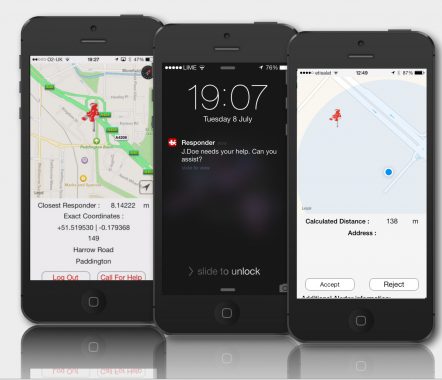GPs are being encouraged to sign up for a new smartphone app that will alert them to medical emergencies happening nearby.
The Good SAM app allows community ‘alerters’ to send out a distress signal to the nearest medically-trained Good Samaritan, while at the same time automatically dialling 999. Medics who are within a few hundred metres can then proceed to the emergency on foot to help before the arrival of emergency services.
Doctors, nurses, paramedics and other people trained in first aid can sign up to receive alerts via the smartphone app, which plots the location of each responder on a map in realtime. GPs who register with the free app will be asked to verify their identity and ability to practice by uploading their GMC number and a copy of their work ID.
Responders can reject requests if they are unable to attend or if their ability to help is impaired (for example, if they have consumed alcohol). The alert is then transferred to the next nearest available responder. They can also ‘opt-out’ on a temporary or permanent basis by exiting the app or restarting their smartphone.
The app was developed by Mark Wilson, a consultant neurosurgeon at Imperial College who came up with the idea after witnessing the effect of brain apnoea and subsequent hypoxia on his emergency patients.
Mr Wilson told Pulse: ‘I see patients all the time who have had a bang on the head and stop breathing. Get them on ventilation and they’re fine, but sometimes, by the time they get to us, they’ve ended up with a hypoxic brain injury.
‘The answer to that isn’t better training – it’s just getting someone with the relevant medical training to them quicker. If you have an accident like that, there are bound to be thousands of people around you trained to help, but they just don’t know where to find you.’
He added: ‘GPs are ideal to sign up, because they’re very spread out. The idea is to cover the areas that ambulances find it difficult to get to quickly. That includes rural areas as well as big cities like London.’
Nearly 2000 people worldwide have signed up for the Good SAM app since its ‘soft launch’ in June, according to Mr Wilson. Nearly 1000 are in London, although other hotspots in Lincolnshire, Glasgow and Dublin have 50-100 people each.
The majority of those who have signed up so far are medically-qualified responders, although Mr Wilson expects more members of the public to sign up once the app launches publicly in three weeks’ time.
As yet, no incidents have been reported via the app, but doctors who sign up are provided with a ‘mission log’ to record the details of any emergencies they are called to. They must also adhere to a strict code of conduct which says they must not delay patients’ transfer to definitive care.
While any actions taken as the result of an alert are classed as ‘Good Samaritan Acts’ (and therefore unlikely to result in legal action), the app’s creators recommend that doctors ensure they are covered by medical indemnity.
Mr Wilson said: ‘People all have questions – what if I can’t respond? What happens if I get called to a rough council estate at three in the morning? But we are very clear that you should keep yourself safe.
‘In general, we’ve seen a really positive response – people are really engaging with the Good Samaritan aspect of it.’

















